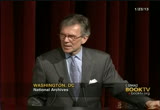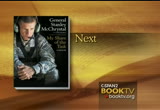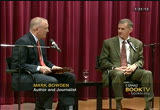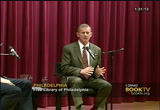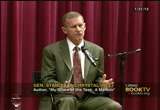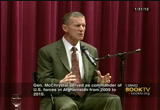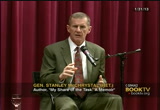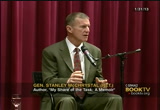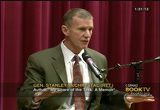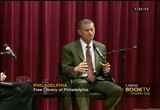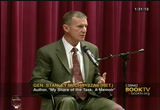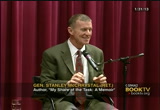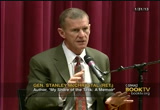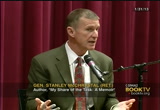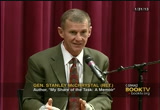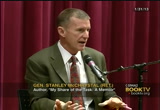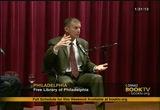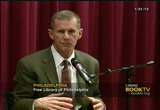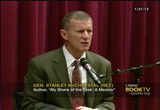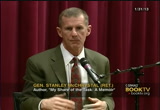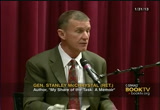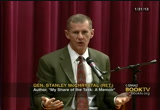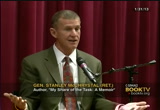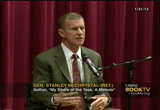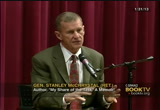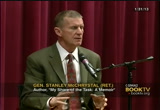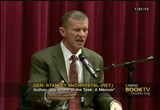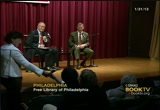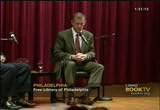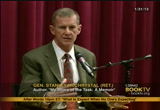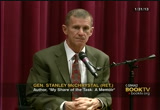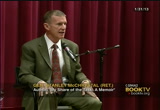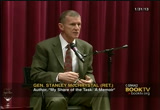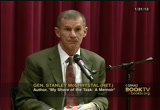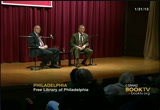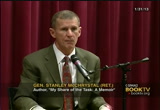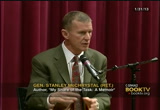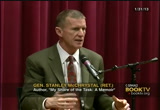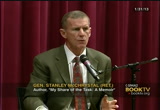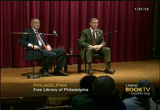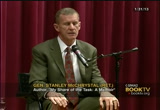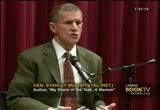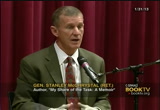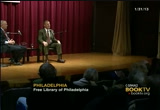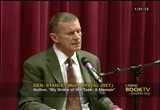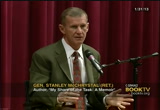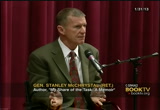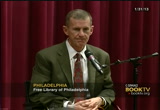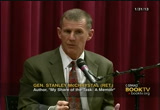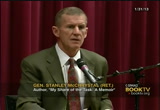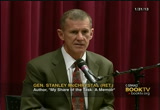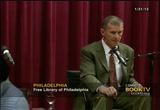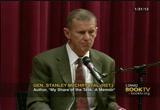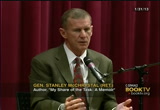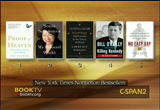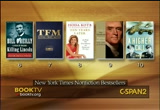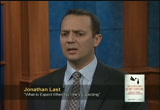tv Book TV CSPAN February 2, 2013 9:00pm-10:00pm EST
9:00 pm
9:01 pm
thank you very much. thank you for coming out. i guess it's a -- i think it's a wonderful opportunity. the jet l man sitting next to me is kind of a big deal. for anyone who is -- pays attention to american foreign policy and military affairs, you know that ever since the attacks on this country on 9/11, the united states has had to evolve militarily in our intelligence community in many ways to meet the challenge of this new enemy. and more than anyone that i think of general mcchrystal has been responsible for shaping that evolution and developing what i call the targeting engine with which is what i think we have adopted as the method
9:02 pm
defending the country. thank you for being here, it's great to see you. >> thank you, mark thank you for the too kind introduction. >> i know that, you know, our -- you are the commander of special operations in iraq and afghanistan, and there has been a rapid evolution. i'm familiar from writing "black hawk down "with the way thing were in the early '90s. can you give us an idea of the overall strategy and we'll get to specifics, maybe but also the tactics you have developed? >> not me. a group of people did. thanks. take a you back a little bit. at end of the vietnam war as america has done at the end of other wars want special operations unit that are created specially get gutted or they get disbanded entirely.
9:03 pm
there's a bias to do away with them inspect in the late 1980s when i joined the special forces they were in pathetic shape. they were barely a shad low what they had been at the hay day of the vietnam war. in 1980, the mission was launched to try to conduct a rescue mission in teheran to rescue the american citizens held hostage in the embassy. it failed not only painfully, but it failed for many reasons but one of which is the special operations capability we had people who were brave and strong and whatnot. they were not an integrated community capable of doing complex things indeed. it was a complex endeavor. it failed. from the ashes there was a holloway commission report. it recommended we take a look at the capability to do the operation and the structure. i entered special operations a
9:04 pm
few years later as a young ranger officer, i was able, and i try to tell this in great detail in the book, when you start to build a special operations capability as we were redoing in in the early 1980 z you find stereotypical guys with big shots, being knuckles, big shoulders. it's important. you have to have that. it's the easiest part. if you're going complex operations, you have too have a huge intelligence capacity, you have to integrate with operators and aviation ability to bring it together. and most importantly you have to 0 culture and the culture has to be mature. that's the word i use carefully. it is not a culture of stereotypical rambo things. it's not the way special operations succeed. that's how you lose.
9:05 pm
and so you have to build a culture that is evolved to problem solving and problem solving in which does that. what happened we went to the first -- i was in the rangers and joined special operation command through the first gulf war we did hunting for iraqi missiles in western iraq. we were getting better and better what we did. we paid huge attention to what mark wrote about black hawk down. that was the operation mooing key shoe. we went to school on the experience aided by the document he had written on an operation that had gone very badly but then had been essentially dealt with by the force on the ground with the exorder their courage. a lot of holes in what we could cocame out. we came out as a fairly brittle force. ie, if everything went perfectly the way you planned it. you are in good shape. when things go badly, as they
9:06 pm
do, how do you deal with it? we started to try to fix that and to make it a more flexible and resell yent force. we went in to 2000, after it 9/11 and the first operations in afghanistan probably the afghan government driving out of al qaeda. where we found others in really late 2003, which was when i returned to specialt operation -- special operations you remember in the spring of '03 the innovation of iraq went well or deceptively well and suddenly things in iraq started to go badly in the late summer. we had a sense that if we could just arrest saddam hussein that would potentially stop the problem. what happened was we did, the force found and arrested saddam hussein. and what had grown beneath the
9:07 pm
surface was a cancer-like networking lead by a guy who created an al qaeda-related organization. it wasn't technically al qaeda at that point. it was a combination of foreign leadership and in frustrated iraqi sunnies. they were a networking and not a smalls or do one or two things. they were trying to run an insurgency. so suddenly the force that had been beautifully designed for the precise but open so thetic occasional operations was unprepared and unable to do the wider problem. it's like having a s.w.a.t. team for your police force for all of philadelphia in real reality if you can't cover everything they can't be decisive. we began the significant evolution. that's where we began to change
9:08 pm
dramatically. >> in somalia task force ranger had been there a month or two before the big battle. during the period they launched six missions. the pace was intelligence gathererring, finding targets, planning and operations. sometimes very quickly. once that intelligence came together and launching bahrain. describe how what open tempo means and how it applied in iron. >> it's interesting. mark get it is right. there were a series of raids mooing key shoe happened a number of months apart. you make a decision you set yourself criteria to launch when the criteria come you launch. it's a pretty centralized, pretty deliberate process. when we got in iraq, we were originally doing that and we would have the precise thing. what we found we were having the effect, narrow effect, slow effect. when we go on a target, for example, we would go to pick up
9:09 pm
an individual there may or may not be a fight. if we captured him and the computer and phone and documents and other things. we capture all of those things, but the force one of our small forces around the country would do the operation. then it might take a day or two for them send the individual back to the headquarter where we begin effective integration. and the stuff captured typical go in to a plastic garbage bag. it would be written in arabic and come back 48 hours before it got to the main headquarter and sit there because we didn't have translators to do it. when i first took over i went in the room and there was a pile of stuff that hadn't been read or exploitedded, as we call it digested for intelligence. counterterrorism is about intelligence. whoever knows the most wins. and so we had this incredible inability to digest operation,
9:10 pm
and operate. we started to get where we could be a little bit faster. we developed a system called f3ea for find, fix, finish, exploit and analyze. that's a sickle you go through. you find somebody and fix them in a location at the time now. you finish by capturing or killing, you exploit whatever you capture. you analyze that and you learn from it. it's basically a learning cycle learning and action. we could that and go through the process. it would be painfullylessly. we were operating with different organizations not all organic to mind and different intelligence agencies and whatnot. and this may surprise you, not all parts of the u.s. government work together seamlessly. [laughter] so here we are as a cycle and we have the things what we call blinks between the parts. and so one element would find a target by the time the information got to the people who are going to fix it usually
9:11 pm
with a predator or something and make sure they are there. time would have passed an accuracy of information. then it would be passed over to the raid force, again, you have a loss it's like the game telephone you whisper around the world andst it's unintelligible by the fifth person. we are try do this. we started and went on a campaign to fix the process. bringing in different parts of the organization. building our intelligence capacity, giving ourselves a mind set that was different before and before it was if each element did the part of the process then they could take great pride. we succeeded. we did what we were told. and we wiped that clean and said nobody is successful unless the whole process works. the definition of winning is the same for all of us. only if we win this fight. that was quite a bit different than what we had. by the summer of things got really bad starting in late march of 2004, in iraq.
9:12 pm
that's when the country basically melted down. and we started operating as hard as we could and op tempo. it's how fast you can operate. we realized the side of the network we were going have to hit it a lot. and we weren't going to be able to hit. once a month. by august of 2004 we got up to 18 raids a month or one every other night. and we thought we were moving at warp speed. literally we thought it was the most amazing thing we have ever done. we are the most efficient and effective special operations task force on the face of the earth. we were. but we were still losing. so we came to the conclusion that we have to got to speed up more. and there had been the fixization on going after the senior leader of the organization or high-value targets decapitation. and we came to the conclusion it wasn't going work.
9:13 pm
we started the war with getting if we thought we would get the guy the organization would fallen apart. think about any organization. i work until the pentagon it would have made it better. so -- [laughter] we realize the you have to go after the people who do the work. the people who do logistics, communications, pass information, build car bombs, communicate. so you to take them out. so we came out with the strategy. and philadelphia love this. it's like rocky and apollo. we're going hit them in the midsection and hit them a lot. from august of 2004 when we did 18 rides, two years later, same month, same force, same fight we were doing 300 raids a month. that's ten a night. now, if you stop and say you ten a night. that's a lot. that's impressive. that means every raid guy on the force is going a raid at least one every night. every pilot is flying one or two
9:14 pm
raids every night. and these raids are not patrols inspect is not a -- these are going in the door somebody is getting shot. extraordinary. and to do that, though, you can't use previous systems. one you have to be able to bring in the intelligence on the industrial scale. you have to get to the point where instead of the plastic bags of information on target, we would start to exploit their computers, their phones, we would take biomettic data and pumped back to west virginia from the target to see if we had the person before. if we had any dealings with them, we would move the documents back immediately scan them, send them back to multiple places in the u.s. and everybody analyzing at the same time. and we would be trying to turn this to learn as quickly as we could. and we got point where we could hit three targets a night from the intelligent intelligence.
9:15 pm
we would find joe smith at 9:00 at night because we had been looking for him. he would find out from what we got on the target about john d.o.e., we might hit that at midnight and another at 3:00 in the morning. the reason it was important to go fast is because the networks will reper themselves quickly. as soon as if we were terrorists, as soon as mark is captured, pretty soon i'm going it hear about it. and the first thing i do is move my location and change my all of those things, connections that i have, you call it cutouts because it moves to repair i.t. you have to be quicker than they can repair themselves and quicker than to develop new leaders. over time we started to see the relative age of lards go down. and the relative effectivenesses go down because of that. it became the rocky strategy of pummeling as fast as you can so it can't breathe. and over time had the decisive
9:16 pm
effect on it. which we actually did along with a number of other factors. one other thing thing is very interesting to me about that change, and increasing l tempo is the role that technology played. i mean, obviously we have seen the development of syndromes, we have seen the application of super computers. one of the things you did is move the intelligence analysts tout to the base there. and integrated everything upfront. can you talk about that a little bit the role that technology played. >> yeah. there's several things in technology that changed the fight. one is obvious it was predators. it wasn't drone strikes. it was drone surveillance. because you put a surveillance that gives you full motion video, anywhere if our force to include the guys on the ground could watch what the predator is watching in real-time video. the real effect of that is
9:17 pm
several. one, it used to take 120 people to raid a target when only twenty were going inside. it takes 100 to secure it outside make sure you don't get people reinforcing or whatnot. if you can do it from the air you only send twenty. now, the other hundred can hit five other targets. we could hit six targets in the time we're hitting one. and you know more. you can put drones over and watch people all the time. if we decided to watch someone in the room all the time. pretty soon we would know which what you call pattern of life. where you go, what you do, whether you're good or bad or involved in the insurgency. so you can build up the knowledge. suddenly you are precise. you're not going out and picking up a bunch of people and trying to figure out who is good or bad. you know a lot. that's one thaj changed it. another was night vision. we had night vision on all of our force. all of our helicopters, everyone.
9:18 pm
and what that meant was you could, of course see in the dark, but in fire fights you're absolutely dominant. we put laser aiming sights on the weapon. ed in the fight against the enemy at night they're not as well trained as our combies. we have the incredible dominance. fire fights our issue is probably 1,000 to one in terms of people getting hit back. the problem is we don't have that many guys. the ones mount up. every time you lose a person it's a huge cost. you have dominance and the willingness to go places, do things you wouldn't otherwise. the other one less obvious is the ability to communicate. video teleconferences and not so much radio but video teleconference. for example, we would take all of our radio nets that was happening on the ground, we
9:19 pm
would -- anywhere you can watch from above what is happening, and you listen to their radio nets from our side. down to at the team level. now, you say, then i can micromanage, we didn't. we never micromanaged. you could reach down and have the situational awareness, which allows you to know what is going and something -- you can do a lot of things to help that force very quickly. and then the other thing that it does is if you're going to be effective against the enemy networking you have to be a better networking than they are. now think what your networking in life is. it can be a combination of things and hue you communicate with them determining often the strength of you know people for
9:20 pm
fifty years. you don't need to communicate as often. we started every day with a ninety minute video teleconference. thousands of people. we pumped information. we had to conversation about updates on intelligence updates what happened. updates and operations. senior leaders every day i'm on it. with all the people so everybody here is a senior leader every day and hear the conversation and hear information go up and con. we create what we
9:21 pm
the only thing i did was constant pressure. and that revolutionized the way we could operate and it was communication at the heart of it. and one of the things you mentioned in your book, general, is how the emotional of the video conferences had on say an intelligence analysts in working on cubicle and who is getting briefed by the guy who went out and acted on the information that they just provided. what kind of effect did it have? >> you naibtd we talked about cultural differents and one of the things about special operators is you're brought up to have this triable culture. it's very macho and it's a little bit intimidating intelligencely so. and people who deal with them often little hesitant. and the operators don't have the expertise. you have it in the intel people and whatnot. as we started to grow we became
9:22 pm
a -- we were communicating so much. when one case i remember -- young analyst in the united states or somewhere and the operation had occurred because of what the analysts had done. and the operators going hey, jim, great job. you know, all part of the team now. another case you go in to are foreign headquarter we pushed operators everywhere and rotated analysts so everybody operated forward and back part of the time. and we see a macho table. there would be a 22-year-old analysts saying you have to do x, x. he's taking it. because it became a -- he wasn't perfect. it took years for us to get to. don't get me wrong. there were starts and stops. it was key because suddenly everybody owned the problem.
9:23 pm
>> right. one of the things you also touch on in your weak is sort of the evolution of the integration. which is a hot topic here. you mentioned that early on that there was a use of these enhanced integration methods. about the can you talk about that a little bit? >> sure. how many people ever run a prison or integration facility? [laughter] that's how many we had in my command. [laughter] and you think about it, go back to 9/11, and the first response is okay, what do we do? how do we do this? we start capturing serious terrorists. what do you do? bring the specialists in. they are literally not any. you brick the specialists in. they go back to history books and has manual on integration. most of the manual were designed to in our conventional war between two armies where you
9:24 pm
capture private x in the soviet army and ask questions. that's the way we are designed. we're talking about guys in a terrorist networking and hard people. so we had to learn our way true it. as you can see, the nation had to come to grips with how we feel about this. we are doing it with gaunt moe and where we're trying people. it's an ongoition discussion. if you remember after 9/11, people jumping out of the twin towers holding hands to the death. it was a different period. everybody wants to remember it now as we're sitting in philadelphia, also reminds you that in baghdad, we were literally knee deep in blood. it was unbelievable what was happening in the torture chambers we were finding. so against the backdrop and the backdrop of losing comrades, we had to take our integration techniques and figure it out. we originally authorized to use what they called enhanced technique which wasn't very dramatic. you could limit a detain knee to
9:25 pm
four hour of sleep a night. you could make them kneel in stress position. i don't agree with that. there was no beating people or waterboarding in anything i was involved in. the best way to get information was long periods of conversation. very respectful and persistent. the individual that lead us to the spiritual adviser, i take if in great detail. we had him for weeks. at one point, you know, we did movie night. we had two prepare interrogators and they go oned the close relationship and talking to him every day. we finally said, let's take a night off and have a movie. and so they brought in the favorite movie and sat there together and watched a new movie. it was the "exerist."
9:26 pm
that's the way we did it. and you just over time -- what you cois con convince that person they want to communicate. they do it for lots of reasons. sometimes because they are scared of being prosecuted within iraqi laws. sometimes because they're worried about the family. there's any range of reasons and entete gassers want to -- interrogators want to use whatever reason. you have to convince them that they want to give you information. the problem with torture, the first, there's a sort of an academic argument whether it works or not whether the information is good. the answer is i don't know. they haven't tortured anybody. it's almost irrelevant what happens in torture is you hurt yourself. the torturer crosses a line and becomes something different from what you're raised to be and what you believe in. once you do that, i don't think
9:27 pm
you can come back very easily. the problem with dealing with press of time you see this thing and stop and the ends justifies the means and so you to stop there. it doesn't. you corrode the force. the other thing that happens is the worse thing that happen during the war in iraq was -- what happened the pictures we believed were an aberration. i think they were. to many people in the muslim world. they were proof positive that america dozen it by policy. we had thousand of young men come from north africa, sir why, saab and other countries because they had seen it and felt they had join the jihad for that reason. once they're in there, certainly
9:28 pm
we had to kill most of them. but they were amped up on a vision of something that preconceptions about the u.s. if you let torture become a policy. that's what happens. you mobilize it and increase the foe and moblize it. any information you get, in any view is less valuable than the cost of getting it. >> i can ask you a thousand more questions. aisle share the wealth. we are -- this is on television. so we have a speakers. so wait for them to give them to you before ask a question. okay. i'll start with my friend rubin. get in the pushup position.
9:29 pm
[laughter] >> you have said and written that feel drones alone is an insufficient policy. i wonder if you would talk about why you feel that, and also, given the we are i areness in the -- weariness in the united of the afghan conflict, and the ineptness and corruption of the afghan government, what do you think is the most effective thing we could do and should do after 2014? >> sure. first, i think that unmanned aerial vehicles or drones, as we know them, are important. they are good for american defense and let us do things we couldn't otherwise do. they need to be part behalf we do. that said, if we issued a bunch of drones to the philadelphia police department and said go after the drug problem in philadelphia, they would be able
9:30 pm
to figure out some drug dealers. they would be able to shoot drug dealers with hell fire missiles and in fact, and in fact they would be right in many cases. but if you think you solved the drug problem, you probably would not. in some cases you would make it worse because many people would experience the exposure. even though they knew the person was a drug dealer, they would be overredded by the fact that you do that. there's a perception even though the shot may only kill people who are absolutely guilty, the perception of everyone wandering away there were civilians there. there's the i want impression that the united states -- you
9:31 pm
lose support. if i'm corrected i may be a little dated. american popularity among the population of pac -- pakistan was not high. at one point it was below india. the people most upset about the drone strikes inside pakistan were not those in the drug strikes occurred. in other part of the cub. -- country they are outraged fear about et theory of it. but it's important because act on ther. seption. so i think we need to have the capability. we need use it. we need to be really mature how we think about if. we need to think through the process. you create negative forces with even well intelligenced positive things. it has to be balanced. >> the gentleman in the sweat shirt back here. that's right. >> you got it.
9:32 pm
[inaudible] >> yeah. >> repeat it. the question is, with weariness of the party and the situation on the ground in afghanistan, what should our policy be? and the answer is i can't give a perfect prescription. i can't tell how many troops there ought to be or how much money to spend. what i think is center fold. first we went to afghanistan people say we shouldn't if be in afghanistan. that's pointless. we are there. two, we went for our reasons not for afghans. they didn't invite in 2001. it meant our goal to get rid of al qaeda. when we upped the taliban government and set the country in to free play, i think we developed a responsibility for helping them set it right. third, i think in america and the world's interest to have a stability region. if afghanistan were to be
9:33 pm
completely unstable, i think pakistan's stability would be very tenuous. and they have challenges anyway. i think it's important. so my view what we need to do is be consistent and persistent in the region. the reason people in afghanistan are nervous because in 2004, they think we're going leave and they have seen us leave before. in 1989 we turned from the region. it doesn't matter which each individual afghan saw that. it's become commonly accepted truth we left in 19 the 9 ab and they're walk in 2014. and they'll be nobody they can rely on. they don't have other strategic allies. what they're looking for, in my view, the idea of a long-term strategic partnership. i don't think that's a specific number of troops in a specific amount of money. ink it's the idea you have an ally somewhere. and their fear is there are very
9:34 pm
far away. i talked to president karzai one day and said how many u.s. troops do you want here in the future? >> i'm not worried about u.s. troops. i want us business. i want you to be here making money. that's interesting. he goes but a if you're making money here, you'll have an interest in our stability. it will be good for you and for us. the fear of afghanistan is their far away, landlocked. they don't make anything we need so we won't care. pakistan actually has been many of the same feelings. pakistan people say pakistan wants us out of the region. i think they want us in the region and want us to be consistent and stay there. their fear is that we are going to come in and pull out again. so up end things and cause issues. >> yeah. i'm a vietnam veteran, and i've been in peace movement for probably the last thirty years. i was in iraq in december of you're and trying to get in the
9:35 pm
parking lot of the prison and of course they wouldn't let us in. my question is kind of i consider kind the elephant in the room. i think i see our current military as dahling with the american people who pave their way as dealing in two distinct modes. i see you as a master of one leg in each. my question is given the vast amount of secrecy that is necessary for the culture that you're evolving very bril i can'tly, -- bril lantly. does it concern you how this what impact this has on democracy? and the citizenship that really doesn't know what the heck
9:36 pm
you're doing it me it's an important question. i wonder if it concerns you at all. >> if i understand your question right and in many ways i argue i've been in the peace movement for a long time as well. if i understand your question you're worried about the balance between necessary secrecy and minor secrecy. there's a certain amount of necessary secrecy. if you have a son or daughter serving and essential information is given on the whereabout and the plan they become vulnerable. i think that's a real problem. if we have any desire to collect intelligence from sources people willing to do it their identity and safety must be required. it's a require for secrecy that is real.
9:37 pm
i think it's balanced against your wider point which is really are the american people informed about the policy? i don't know if you read daniel's book. i read the book "secrets" in 2005, i think. when it came out. he was the guy who copied pentagon papers. it was an interesting book i had ban student of vietnam before that. the basic outrage came from after being part of the pentagon papers study, is what it was. he came to the conclusion that american policy makers weren't stupid. they had done annalist after annalist and coming to the conclusion what they needed to in vietnam was x, but politically they weren't willing do that. they were willing to do y. they were following policy y cynically knowing the possibility of success was
9:38 pm
left. they were taking a politically expedient route against policy prescription said if you want to succeed you have to do. so i thought about that. it's a difficult question to ask. you ask yourself how are you supposed to tell and how much are they supposed to know? i think we struggle today with trying to explain something as complex as afghanistan and not doing it in a organized enough manner. if you go to back to world war ii, someone could put up a map and you could show progress across the country. it would be hard to do that. even when you're there you're grappling with truth. i cocould go to afghanistan and write fifteen stories and convince you it was a disaster. they would be true. i could write stories that
9:39 pm
convince you that afghanistan is a great thing. they would be true. the problem is what is truth overall? everybody wrestles with that. i didn't see a lot of effort to deceive the american people. i didn't see that. i didn't see people trying to begin things wrong. i saw bad decisions dryinged with. i saw people wrestling with things near term political or media pressure. we get up in the morning trying to get through the day and sometimes we go boy we should have been next year. i saw some of that. i didn't see a lot of evilness. let's deceive the american people. i haven't a process for a truly informed debate on policy issues like iraq and afghanistan and syria. a few months ago was screaming we got to go to syria tomorrow. we have to save the syrians.
9:40 pm
whether it's right or wrong i don't think it was well informed. people are diagnose we have go there. and the response is what side are you going to be on? you have to figure that out first. i think it gets to your point. i'm not a they are resist i've been involved close to know there aren't many conspiracies that work. and there aren't many secrets because most get leaked. they don't get leaked completely accurately. that's my experience. >> the gentleman in back. that faded awayed with soviet union. we hear about nuclear capability
9:41 pm
of rogue nations like north korea and iran. and this constant drum beat of what happens if iran succeeds or what happens if the north koreans have a weapon that can reach america. i'm just curious to know your perspective 0 -- should we be worried about missiles from north korea. about the israel attacking iran. all the things in the news. >> thank you. that's a great question. i would be worried about it. i don't think that the is direction of the world is close to where it was back five minutes to midnight or one midnight to midnight if the cold war. with the ability with the miscalculation to have a war that end civilization as we know it. i don't think it's as likely now. however, what you have is nuclear proliferation of not only weapons but also the technology and understanding of
9:42 pm
it at some point it gets to irrational or irresponsibility actors. the whole idea of nuclear strategy and the '50s, '60s and '70s based upon the fact that the something to lose. the danger is someone gets a weapon like that but they don't perceive they have anything to lose. i think what everybody is scared about with north korea is a erratic leadership. they've been, you know, they've been irrational actor to date of a sort. they haven't found anybody. there's a concern. i think the thing about iran that worries people so much. they have been very irresponsible using people like lebanese, hezbollah and the president does not inspire confidence. so there's the sense that they continue have destroy the world. all they have to cois get a few weapons out because of where they are. because of what they can do. they can do, you know, damage to
9:43 pm
a small country like israel or to saudi arabia. what it's done is lowered the threshold. they don't have to do as much but if they did any of that, it would be very, very painful for the people involved. even worse than that the next step is once you get beyond a nation's state, the one thing good about the nation that have nuclear weapon you have a geographic call place to go after if they act with nuclear weapons or weapons of mass destruction. if it gets to terrorist organization, they don't have one. they have nothing to hold at risk. and so suddenly they can use it -- they can't destroy the world -- i think we should be worried about it. i think nuclear and by logically chemical weapons are threat. i think cyber weapons are coming to the same area.
9:44 pm
they don't the barrier to entry for cyberattack is low. you don't have to have a lot of stuff to go after somebody's cyber system. so we need to become more resilient and hard end. >> gentleman in the suit. keep your hand up. there you go. thank you. expwrrn you know -- thank you. general you know our capability in the electronic warfare. what happened in benghazi? >> yeah. umm, yeah. i got a very classified briefings on it and i can't share the stuff. what i'll tell you is we don't really know. there was a brave ambassador out in a consulate with seven americans total. and some local forces guarded it. what i saw of the attack it looks like a very disorganized
9:45 pm
grouch people who walked in they didn't attack to get in. there was not an attack to the consulate area. the residence area. they walked in and open gate. they walked around. they didn't know the ambassador was there. they didn't know -- they started a fire in the building and he happened to the safe room and killed by smoke inhalation. i think that part of it appears from what i saw to not have been a very organized thing. now, could it have been somebody organized and saying let's do it in execution they look pretty disorganized? it could have been. it strikes me more as an emerging good idea, you know,let do this and more people came in to do do it. there was a later attack on another location that involved weapons that somebody was more serious rocket propelled grenades. but i couldn't see a well organize straited , you know, i have seen a lot of well orgestrated attacks before. that didn't appear to be one. i think the bigger question is what do we coabout it? there's a certain desire to say
9:46 pm
we can't put our diplomats and service people in harm's way. i say if we can't do that. you can't be in the world. you can't put a marine battalion everywhere. they won't want and build fort reses and engage with the people. we have to celebrate people like ambassador chris stevens who died bravely. we have to get a lot of americans dealing with people. some will be harmed. but we'll learn the language and relationship, and build people have a real interface with the world. that's i think the finger pointing has the danger of creating this forres mentality whenever we are. [inaudible] >> good afternoon, general. thank you for to you and mrs. mcchrystal. i'm a marine sergeant and the reserve and i'm working for the navy. good afternoon, again.
9:47 pm
my question is do you think we're in risk of the same mistake we saw after vietnam in losing the expertise with the potential sequester and the possibility of losing special operations funding and the hard, expertise of our special operators? >> yeah. yeah we are. first, the difn budget is already coming down and needs to come down a lot. the -- defense budget has gotten huge and based upon the nation's finances we have to bring it down. i think the process is already underway. what people talk about defense they talk about we need to spend three or 4% of gdp for defense. i think that's a dumb approach. you need to spend as much foreign defense as you need to defend yourself. it was designed to be something
9:48 pm
so that sane people would never let it happen. [laughter] we confused the last part. because what happens is now if you sequester in 2013 and you don't make the decision until early spring, they only have the rest of the fiscal year to execute that. they have to take the cut about the last six or seven month of the years. less of your income in reality, you know that only 15% of your income is what you spend on food and that sort of stuff. everything else is rent or whatever. we stopped doing a lot of things
9:49 pm
we need to do. if you're going cut the defense budget. you have to contract it consistently and carefully. again, it has to come down. >> the third row. yeah. >> general, you certainly make war sound very exciting and in the long-term peace activists. not easy to say that. and the drones mark is quoted as saying are a terrifying tool. the ability to target far off individuals. how can you condone the drones.
9:50 pm
[inaudible] and the decisions about drones seem to be made unilaterally. i think that's kind of inconsistent in the democracy. >> they are very firm questions. i see it slightly differently. but first off, i don't think they are discriminately fired. i know the process. it's actually very carefully done. and, you know, i used to ask the question people say you can do this, but you can't do this. and if you're going to kill somebody it's at the end of the day in a legal sense. it doesn't matter. if you parachute in american special forces and kill somebody as opposed to using the drone. and sphiems that creates more. but there's a cultural part of it that you're hitting on that i think is important. if you are a nation or a part and particularly a warrior nation like afghanistan or pakistan of the culture and somebody has technology to allow them to stand off and impunity,
9:51 pm
they don't respect you as a warrior. they don't think of you this guy came up with the motto and took the best chance and he got me all right. they don't the technology. they think how you feel if you knew drones above you. the other thing i worry about is the threshold. go back to 1998. president clinton launched missiles based on the intelligence from the embassy blown up in east africa and launched missiles to
9:52 pm
afghanistan. they hit target and if you had asked any of us in the room the next morning whether america was in war, i trust that all of us would have said no. we fired the missiles but we're not at war. if you asked people near the impact of the missiles they have a different view. and so the danger is it can potentially lower the willingness to use force and not think of it as a war. and yet you build up enemies. you build up people who think they're at war with you. when did al qaeda go to war with united states and the average answer is 9/11. al qaeda declared war against the united states in 1996. most of us didn't get the memo. but they attacked the cold, the attacked east africa. they were at war with this.
9:53 pm
there's danger when one side is at war and the other isn't. the danger of the technology is that any time you can sit back and do something to somebody else, you don't necessarily feel. if your son or daughter was going to the target area and you spend a sleepless night worrying about them. you have a different view of the mission. you would be more connected to it. technology has the danger of throwerring the threshold and can become politically easier to operate it without putting forces at risk.
9:55 pm
something is going to come to ahead with a iran. it's going to be a different four years. i think he has great background to bring to it. from the senate is useful and the time in vietnam is imriewfl. it gives you context. the most important thing if he and president obama are a good team, that is what matters. i don't worry about the policy positions. one way or another. he's not going to be a policy maker. president's policy is going go. but the fact that they feel that they can be a good team, to me that's an important thing. unless the.nominates somebody who is just, in my mind, unqualified or something. i tend to think leader should get who they want. we'll hold them responsible for the outcome.
9:56 pm
>> thank you, general mcchrystal. we have to stop now. [applause] >> we'd like to hear from you. tweet us your feedback twitter.com/booktv. here's a list of the ten best selling non-fiction e-book and print tiemghts according to the "new york times." it reflects sales aves january 31st. she appeared on booktv to discuss her book. and you can watch her discussion online at book of it -- booktv.org. lawrence wright debuts on the list third with the look to the world of church of scientology in going clear. scientology in hollywood. no. 4 bill they recount the
9:57 pm
assassination of john f kennedy. it's in the 16th week on the list. mark owens no easy day. a detailed account of the mission to kill osama bin laden is fifth followed by the second appearance on the list with killing lincoln. that's sixth. the creators of total frat move.com and w. r bollen is seventh with the book of fraternity humor. eighth hoda cron criminal of a personal transformation of six people in the book "ten years later." john's biography of thomas jefferson is ninth. and no. 10 adam's and larry alexander tell the story of an american and german pilot flighting over germany in 1964 with a "higher call" for more go
9:58 pm
to ny times.com and click on arts. you were able to see the fraternity rates declining. by the time we hit the second world war we are right around the replacement rate. and immediately after the -- second world war we had the only major of increase in the fertility rate. that's the baby boom. everybody knows about that. everybody, you know, that's a term which -- and it was a remarkable moment. not only did the fertility rate increase quite high, you know, 3.7, i think. for white americans and 3.9 for black americans. not only did it jump up. it stayed up for an entire generation. it was a long lasting effect. people changed the way they lived for a generation. by 1970, that momentum, that moment had ended.
9:59 pm
119 Views
IN COLLECTIONS
CSPAN2 Television Archive
Television Archive  Television Archive News Search Service
Television Archive News Search Service 
Uploaded by TV Archive on

 Live Music Archive
Live Music Archive Librivox Free Audio
Librivox Free Audio Metropolitan Museum
Metropolitan Museum Cleveland Museum of Art
Cleveland Museum of Art Internet Arcade
Internet Arcade Console Living Room
Console Living Room Books to Borrow
Books to Borrow Open Library
Open Library TV News
TV News Understanding 9/11
Understanding 9/11